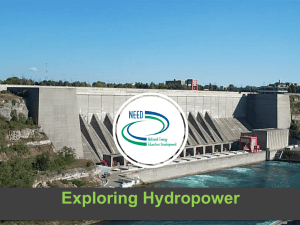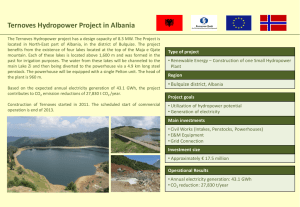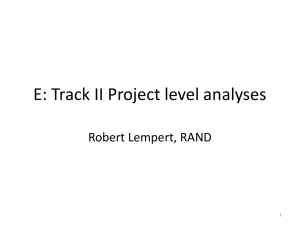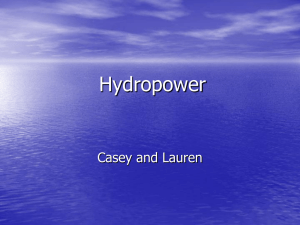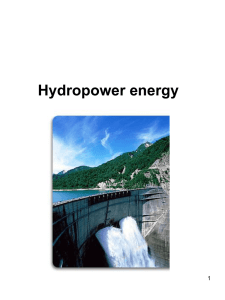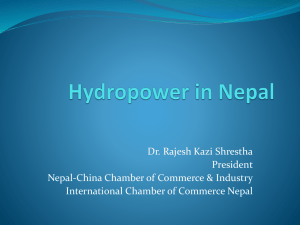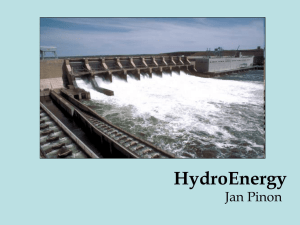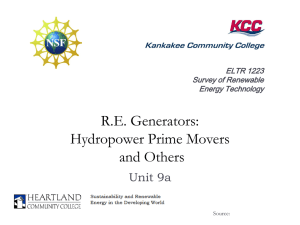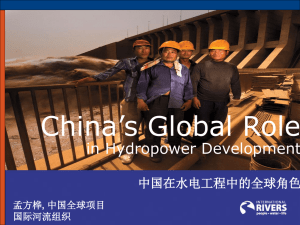- EUROPEAN HYDROPOWER SUMMIT
advertisement
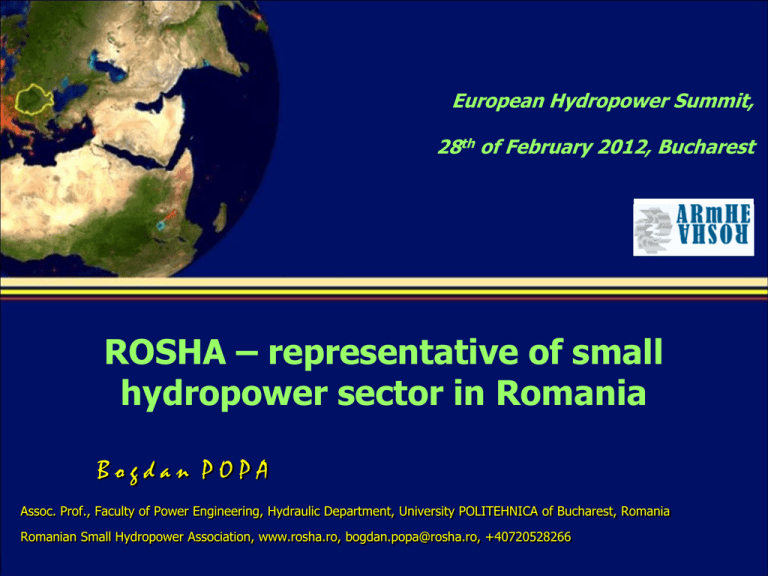
European Hydropower Summit, 28th of February 2012, Bucharest ROSHA – representative of small hydropower sector in Romania Bogdan POPA Assoc. Prof., Faculty of Power Engineering, Hydraulic Department, University POLITEHNICA of Bucharest, Romania Romanian Small Hydropower Association, www.rosha.ro, bogdan.popa@rosha.ro, +40720528266 European Hydropower Summit, 28th of February 2012, Bucharest Bogdan POPA: ROSHA – representative of small hydropower sector in Romania Inland resources: 1,700 m3/year inhabitant, or 3,250 m3/year inhabitant taking into account the Danube 4,864 watercourses 78,905 km long (inventoried and coded) Accession to the European Union on the 1st of January 2007, together with Bulgaria European Hydropower Summit, 28th of February 2012, Bucharest Bogdan POPA: ROSHA – representative of small hydropower sector in Romania inventory on 24,700 km of rivers (including 1,245 km the Danube river): 8,000 MW 70,000 GWh/year, calculated on a basis of 30 years’ data for river flows. Specific power Length of inventory rivers Theoretical gross linear potential (kW/km) Total (km) Percent (%) Total (MW) Percent (%) < 200 14,560 62 1,140 19 200…500 5,460 23 1,780 30 500…1000 2,440 11 1,620 28 > 1000 990 4 1,320 23 Total (rounded) 23,450 100 5,900 100 European Hydropower Summit, 28th of February 2012, Bucharest Bogdan POPA: ROSHA – representative of small hydropower sector in Romania - 34 TWh/year, from which - 23.3 TWh/year (68.5%) on the interior rivers, and - 10.7 TWh/year on the Danube river. According with the EU: SHP = HPP with Pi <= 10 MW Technically feasible potential of SHP is estimated at about : 1,134 MW respectively 4,078 GWh/year In 2011: ~300 SHPs, ~364 MW, ~950 GWh European Hydropower Summit, 28th of February 2012, Bucharest Economically feasible Technically feasible Gross theoretical HYDROPOWER POTENTIAL 100% Economically feasible with environmental constraints (remaining) Economically feasible potential (c) Bogdan POPA: ROSHA – representative of small hydropower sector in Romania Environmentally compliant potential (Excluded potential) Protected sites/ designated areas: Natura 2000, Nature reserves etc) (e) (d) Normalised (actual) electricity generation Potential with environmental constraints taken into account (Remaining potential) a b c d Conceived by Petras Punys, President LHA, within the project SHP STREAM MAP Percentage (%) of economically feasible potential that has been developed: e/c·100% European Hydropower Summit, 28th of February 2012, Bucharest Bogdan POPA: ROSHA – representative of small hydropower sector in Romania SHP privatization in figures, 11 companies Year No. of SHP Installed capacity (MW) Average annual energy (GWh/year) 2004 18 22.91 37.50 2005 10 12.20 19.20 2006 20 6.93 9.06 2008 39 23.28 30.775 Total 87 65.27 96.53 European Hydropower Summit, 28th of February 2012, Bucharest Bogdan POPA: ROSHA – representative of small hydropower sector in Romania Year Installed capacity [ MW ] Energy production [MWh] No of GC’s 2007 29.683 38,619 39,113 2008 40.405 121,435 121,450 2009 75.959 197,756 197,751 2010 75.943 273,044 274,439 2011 123.589 154,452 161,220 European Hydropower Summit, 28th of February 2012, Bucharest Bogdan POPA: ROSHA – representative of small hydropower sector in Romania E-RES PROMOTION SCHEME IN ROMANIA Mandatory quotas combined with tradable green certificates (GC) Fixed quantities established by Government Decision from 2010 up to 2020 Market price for GC, until 2014, limited between: minimum – 27 €/GC maximum – 55 €/GC European Hydropower Summit, 28th of February 2012, Bucharest Bogdan POPA: ROSHA – representative of small hydropower sector in Romania RES eligible to participate in the Green Certificates Trading System: SHP new (starting with 01.01.2004) 3 GC/1 MWh for 15 years SHP refurbished (put into operation since at least 15 years and replacement of existent technologies with modern ones for growing the efficiency of production of energy) 2 GC/1 MWh for 10 years SHP other then the cases above 1 GC/2 MWh for 3 years Wind 2 GC/1 MWh to 2017 - 1 GC/1 MWh starting with 2018 Biomass, biogas, biofuels, geothermal 3 GC/1 MWh Solar 6 GC/1 MWh NO specifications for: waves, tidal energy, tidal impoundments, Ocean stream European Hydropower Summit, 28th of February 2012, Bucharest Bogdan POPA: ROSHA – representative of small hydropower sector in Romania Expected income for promoted green electricity in SHP GREEN ELECTRICITY GREEN CERTIFICATES Option to be sold: By bilateral contracts at negotiated prices On Day Ahead Market To distribution companies at regulated price Option to be sold: by bilateral contracts on the centralized GC market Regulated price is 132 RON/MWh ~31 €/MWh 3, 2, or ½ GC 1 MWh GCs prices: 2008-2014: 27 … 55 €/GC 2015-2030: min > 27 €/GC Total revenue: 44.5 .... 196 €/MWh European Hydropower Summit, 28th of February 2012, Bucharest Bogdan POPA: ROSHA – representative of small hydropower sector in Romania ROSHA is a Romanian non-profit legal person, registered according to the legal provisions. ROSHA is a professional, non-government, non-political association without lucrative purpose. Since 2008 (its founding year), ROSHA is a member of the European Small Hydropower Association – ESHA and benefited by its direct support. ROSHA acts in the field of electricity generation in small hydropower plants and enables legal and organizational contacts with government and non-government institutions and bodies within the country and abroad. European Hydropower Summit, 28th of February 2012, Bucharest Bogdan POPA: ROSHA – representative of small hydropower sector in Romania ROSHA represents the interests of its members and – by concrete lobby actions – defends their rights. ROSHA promotes ideas, programs, actions (including the organization of events: conferences, round tables) complying with the requirements and needs of its members. ROSHA has in view and aims the following: Drawing up a system for the representation of the interests of its members in relation to the state relevant authorities, in view of developing and supporting the electricity generation in small hydropower plants and in relation to ESHA, as well. European Hydropower Summit, 28th of February 2012, Bucharest Bogdan POPA: ROSHA – representative of small hydropower sector in Romania Encouraging of partnerships between the association members. Cooperation with relevant institutions and bodies within the country and abroad. Supporting of research and preparing of studies concerning the hydroelectric potential of the inland rivers and the opportunity of small hydropower plants location in harmony with the environment. Organization of experts trainings, of conferences, workshops, round tables in the small hydropower field. Submission to ESHA of small hydropower data from Romania and the public presentation of Romania position, as well. By the role it assumed, ROSHA intends to establish a permanent contact between and with its members, in terms of mutual support and achievement of the main goals in the small hydropower field. European Hydropower Summit, 28th of February 2012, Bucharest Bogdan POPA: ROSHA – representative of small hydropower sector in Romania Presentations in RENEXPO Bucharest 2008, 2009, 2010, 2011 Co-organization of a national Conference about SHP at RENEXPO in Arad in 2009, 2010 and 2011 Co-organization of an international Conference about SHP at RENEXPO in Bucharest in 2010 and 2011 Participation at Sun-E forum Protocols with IRE, Sun-E Member in Renewable commission of SIER Participation in round tables having as subject SHP: in October 2009 organized by IRE and Hidroelectrica at CCIB, at 16th of September 2010 at Hidroelectrica where it was co-organizer at 18th of October 2011 organized by IRE and Hidroelectrica at Hidroelectrica where it was co-organizer European Hydropower Summit, 28th of February 2012, Bucharest Bogdan POPA: ROSHA – representative of small hydropower sector in Romania Presentation in RENEXPO Budapest 2007, there where the idea of the association was born Participation at 2 International Conferences dedicated to SHP and organized by ESHA: Hidroenergia 2008 and 2010 Close to ESHA in 2 European projects: SHERPA and SHAPES Participation with 2 people to an European project: SHPSTREAMMAP European Hydropower Summit, 28th of February 2012, Bucharest Bogdan POPA: ROSHA – representative of small hydropower sector in Romania 7 days, 20 answers related to: ROSHA initiative: SUMMARY OF OBSTACLES IN CARRYING OUT SMALL HYDROPOWER PLANTS 1/3 Permits and authorizations: many permits and authorizations from many state authorities; conditioning of obtaining a certain permit by the obtaining of other permit considered necessary; conditioning of issuance of a certain permit by the performance of certain works, necessary for the locality, which have nothing to do with the investment. Site approval and connection technical evaluation report: difficult to obtain, very high costs by arbitrary decisions. Water Management Permit: difficult to obtain due to the legislative provisions and also to the technical specifications for the preparing of technical documentations in view of renting the lands necessary for the investments development; signing of a rental contract and payment of monthly rent, without the certitude of obtaining the permit. European Hydropower Summit, 28th of February 2012, Bucharest Bogdan POPA: ROSHA – representative of small hydropower sector in Romania ROSHA initiative: SUMMARY OF OBSTACLES IN CARRYING OUT SMALL HYDROPOWER PLANTS 2/3 Cadastre: lack of lands cadastre which impedes the development of SHPs. Legislative frame: complicated, ambiguous and not finalized. Green certificates: reducing of the number of green certificates for the projects carried out with non-reimbursable funds. Concession of the minor riverbed: high value, rental conditions similar to those of a building rental; considering of the construction structured related to the SHPP as being temporary; sometimes the land has to be rented from two parties: from the owner and from the „Romanian Waters” National Administration. Financial security for a site: very high value for very low capacities, possibility of losing it if the completion of the investments is delayed for reasons beyond the investor’s control. Environmental Non-Governmental Bodies: their reactions are not always justified; often they try to block a project before understanding the positive aspects related to it. European Hydropower Summit, 28th of February 2012, Bucharest Bogdan POPA: ROSHA – representative of small hydropower sector in Romania ROSHA initiative: SUMMARY OF OBSTACLES IN CARRYING OUT SMALL HYDROPOWER PLANTS 3/3 Rivers hydropower potential: compulsoriness to develop at least 70% is not always a sustainable option, sometimes it is preferable for less to be developed, to be in compliance with certain environment indicators or other uses of the water. Water price: high value; the same price for high or low heads; compulsoriness to pay for the whole cascade of small hydropower plants and not only for the intake as it would be normal (same water is used in several power plants). Uncontrollable primary power output: the new legislation does no longer provide this notion; compulsoriness to pay penalties for the hourly unbalances of the uncontrollable power output leads to unpredictable increases of costs and, in many cases, questions the viability of the power output in small hydropower plants; the unbalances are to be supported even in small hydropower plants of below 1 MW capacity. Public information system: scarce; data of the hydroelectric potential, information on permits, water use authorizations and their owners have to be public. Charges: high value; not correlated to the objective parameters; sometimes retroactively applied; they are different from one region to another for similar parameters. European Hydropower Summit, 28th of February 2012, Bucharest Bogdan POPA: ROSHA – representative of small hydropower sector in Romania ROSHA conclusion: 1. It was reached a deadlock in promoting the investments in SHP, generated by the following categories of problems: - lack of correlation of certain legislative provisions included in different legislative acts concerning this type of investment; - non-acceptance by certain state institutes of certain legislative provisions from the legislative acts in force, not specific to their field of activity, some of them being even at the level of organic law; - issuance of certain legislative acts intended to be retroactively applied or of which application is set without being fulfilled the applicability conditions. European Hydropower Summit, 28th of February 2012, Bucharest Bogdan POPA: ROSHA – representative of small hydropower sector in Romania ROSHA conclusion: 2. In the absence of certain clarifications, both with regard to the approval and authorization procedures of this type of investment project, and with regard to the accurate determination of the institutional role and responsibilities, it was reached an abnormal situation in which the promotion of this type of investment is different from one county to another. European Hydropower Summit, 28th of February 2012, Bucharest Bogdan POPA: ROSHA – representative of small hydropower sector in Romania ROSHA conclusion: 3. Apparent volatility of the legislative frame, generated by the differentiated interpretation and application by the main bodies, and especially locally by the state, has determined the following: - decrease of the investment appetite; - blocking of certain projects under various stages, including certain projects approved to be co-financed from structural funds (given that the priority of the Romanian Government is to draw structural funds); - emergence of great difficulties within the process of project implementation: the performance stage and subsequently the stage of passing to commercial operation. European Hydropower Summit, 28th of February 2012, Bucharest Bogdan POPA: ROSHA – representative of small hydropower sector in Romania ESHA conclusion: We have received the document you prepared “Summary of obstacles in carrying out Small Hydropower plants” in which you analyse 14 aspects of policy, environmental, financial, technical and legislative system, responsible for the current state of Small Hydropower (SHP) situation in Romania. We have carefully studied the document and have decided to approach this issue together with ROSHA staff and identify whether the way in which Romania has transposed the European Directives in national legislation and the correlation among different laws or decisions between different administrative sectors serves the purpose of promoting SHP to its fullest. European Hydropower Summit, 28th of February 2012, Bucharest Bogdan POPA: ROSHA – representative of small hydropower sector in Romania ESHA and ROSHA We propose to elaborate a common document to be submitted to the Romanian legislative authorities in order to correct possible anomalies. The most suitable and important recommendations will probably be the following two: - to establish a one stop shop for the renewable energy sources including SHP - in Romania and - to propose a Government Decision in order to harmonize all the different regulations issued by the national administration. European Hydropower Summit, 28th of February 2012, Bucharest Bogdan POPA: ROSHA – representative of small hydropower sector in Romania ROSHA is open to discussions with Ministries and NGOs, on one hand and with all interested companies or persons in SHP field, on the other hand ROSHA can assume the role of a SHP national lawyer “if and only if” the investors intentions are to develop projects in compliance with all regulations in force and with the environment, from the start till the end ! ROSHA aims for the implementation of a SHP project to be done exactly as it was assumed in the documentation prepared in order to obtain the authorisations even if, using environmentally friendly technologies is costly; this is one of the reasons the Government grants support European Hydropower Summit, 28th of February 2012, Bucharest Bogdan POPA: ROSHA – representative of small hydropower sector in Romania SHP Peleș (1880), the oldest in Romania Foto: Bogdan Popa We can really build environmentally friendly Small Hydropower Plants ! Thank you ! SHP Bistrica, Slovenia Foto: Bogdan Popa
